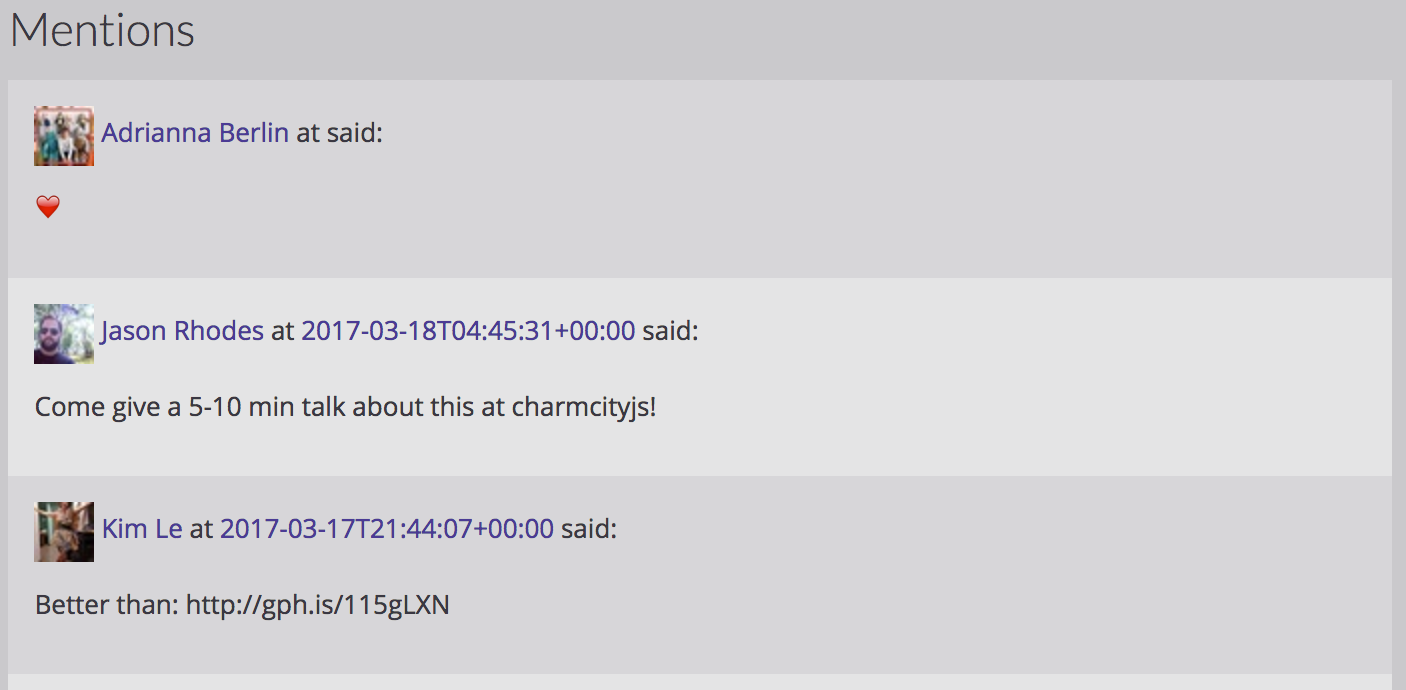Site updates: Displaying Webmentions!
Webmentions are one of the most interesting and powerful technologies floating around the IndieWeb. At their most basic, they sites on the web to interact by sending a notification when a page on one site links to a page on another. When combined with machine-readable metadata like microformats2, they enable really neat social interactions between sites, feeding back likes, comments, bookmarks, shares, event RSVPs, and plenty more.
Receiving Webmentions
A site doesn't have to do all its own Webmention handling, and there are a few services that will handle them for you. I set up my website with the Webmention.io service back in August 2016 (so long ago!) and it's been accepting mentions from other sites since then. And, while there aren't a lot of websites that send Webmentions natively, there are services like Bridgy which uses Webmentions to backfeed social interactions to my site from sites like Facebook and Twitter. Pretty neat!
Sending Webmentions
When I publish a post with a link to a site that support Webmentions, I still need to actually send that notification. I haven't yet built a tool that does that for my own website, but I have been able to make use of Aaron Parecki's Telegraph, which will take in a link to one of my posts and parse it for outgoing links, find out of the targets of those links support Webmentions, and allow me to send them with the press of a button. It's ridiculously easy to use and has the added benefit of letting me pick-and-choose which links go out as Webmentions.
Displaying Webmentions
Webmention.io has been collecting mentions for my site for something like 6 months, but they don't just magically show up on my site! Webmention.io provides an API for fetching the mention data for individual pages, or all mentions for my domain.
My site is built on Jekyll, a static site generator, and I like that so far it doesn't rely on JavaScript for folks to read it. I didn't want to require JavaScript for displaying mentions, so I needed a way to "bake in" my mentions for each post. I was inspired by Aaron Gustafson's jekyll-webmention_io, but found that I didn't like some of the choices in markup or the way that it stored the mention data, so I went ahead and wrote my own. It's still heavily a work-in-progress, but I do hope to release it for other folks to use once it's more stable.
What works? Let's see!
Here's an example post with some Likes and RSVPs (both "yes"es and "maybe"s):

And an example post with some replies backfed from Facebook:

All of these are being displayed with the data that Webmention.io provides with its API, and there are some types of post that I would like to handle differently such as the ❤️ above (which was a Facebook "heart" reaction), and I'd like to include a JavaScript enhancement that will show any new mentions, so they aren't sitting in "limbo" until I make a new post.
Overall, I'm really excited to finally be showing these on my site! I think Webmention is a pretty critical part of bringing the "social web" into the IndieWeb and back out of the silos. I am grateful to all the folks that have made this possible with their work on standards and tools!
Likes
Mentions
Jonathan Prozzi and I have challenged one another to make a post about improving our websites once a week. I'm a little late with this one! I recently added support for displaying mentions, such as likes, reposts, comments, etc. from around the web that refer to the posts on my site. One thing the update didn't do is catch another type of mention, such as when someone mentions me in a tweet (example). These get fed to my website by brid.gy, but weren't displayed anywhere. So, I created a …
Jonathan Prozzi and I have challenged one another to make a post about improving our websites once a week. I'm late with this one! Most of the features on my website are experiments in learning new things. Sometimes I learn a better way of doing something that I've already built into the site and it's time to migrate! Moving Media files from Git LFS to a Media Endpoint I build my site with Jekyll, and I store my site's configuration and text content via Git. One of the things that most folks …
Jonathan Prozzi and I have challenged one another to make a post about improving our websites once a week. Here’s mine! Back in 2008 I started a new blog on Wordpress. It seemed like a good idea! Maybe I would post some useful things and someone would offer me a job! I wanted to allow discussion without the dangers of letting strangers submit data directly to my server, so I set up the JavaScript-based Disqus comments service. I made a few posts per year and it eventually tapered off and I …

This is the conundrum with static sites in the IndieWeb world. How do you enable a live, real-time engaging site when your site is built to be static? My solution thus far has been to build a node.js app that runs on the same site as my Jekyll server. I’m actually using a lot of node.js to rebuild my site: When my git repo gets a new commit or when I hit a secret URL and soon, when my site receives a micropub request, it causes Jekyll to pull down new code from the repo. Then it runs a local …